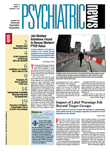I read with interest the report of Blader and Carlson's study in the June 15 issue on the dramatic increase in the rates of children hospitalized with discharge diagnoses of bipolar disorder. They reported that since 1996 the rate of children discharged with the diagnosis of bipolar disorder has increased fivefold. The cause of this seems obscure. They suggested that upcoding (reporting a more pathological diagnosis to insurance companies to justify admission) might be at least partly to blame. In any case, I think most clinicians would agree that the diagnosis of bipolar disorder is currently being made significantly more frequently in children than in past years. This has occurred in spite of no change in DSM criteria for bipolar disorder. The implications of this in relation to our supposedly scientific diagnostic criteria are worth pondering.
It may be that we have only recently become adept at diagnosing bipolar disorder in children. David Axelson, M.D., is also quoted in this review (although he is not a co-author of the paper) as suggesting that the increased rate of bipolar discharge diagnoses may reflect frequent need for readmission among these children. If they are in and out of the hospital more often (because of chronic instability or difficulty in managing them), the number of discharged children carrying the bipolar diagnosis would go up.
If this claim is accurate, it may raise another concerning thought. In the September 1996 American Journal of Psychiatry, Drs. Sara Bolton and John Gunderson published a clinical case conference in which they presented a young woman who was diagnosed as bipolar. They claimed she was actually a borderline personality. They also suggested that the bipolar diagnosis resulted in the thrust of her treatment being primarily medication based, which in turn resulted in deterioration in her condition. They argued that this diagnosis resulted in a sense of the patient's being out of control of her life and emotions and that this in turn resulted in significant regression.
It may be important for us to consider whether the many young people who in the past would have been diagnosed with various other disorders such as oppositional, conduct, or personality disorders and who are now being diagnosed as bipolar may not be experiencing the same problems described by Bolton and Gunderson (thus resulting in poor response to treatment and need for more frequent admissions).
Just to be clear, I am not suggesting that bipolar disorder does not occur in children. What I am suggesting is that when bipolar disorder becomes the default diagnosis for any child who is moody, difficult to manage, or stubborn, and when the primary mode of treatment becomes mood stabilizers, we might be missing, admittedly in some ways, harder-to-treat and manage family, environmental, and personality issues, and we also may be serving our patients poorly. The bipolar diagnosis needs to be made cautiously and after careful examination. If a “bipolar” child is not responding robustly to“ treatment,” it is imperative to reconsider the diagnosis.
